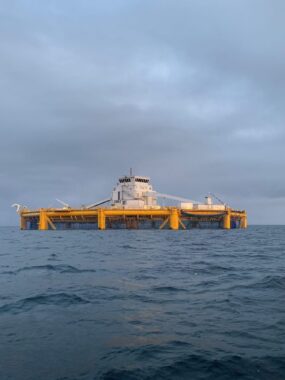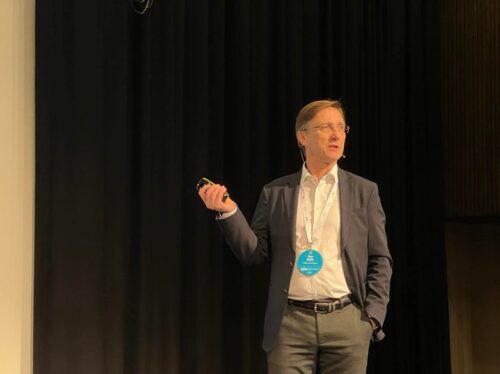Three Norwegian superclusters can form a new industrial adventure, former shipyard director Roy Reite believes.
Earlier in the day, Minister of Fisheries Bjørnar Skjæran outlined new regulations for salmon farming at sea. At the same time, Aqualoop launched its new Spar-rig, Big Dipper.
The tone is set.
The main hall at the Clarion Air Hotel, close to Sola airport outside of Stavanger, is packed. Several hundred people. Times are good in the oil city of Stavanger. A barrel of oil costs 97 dollars. Investment budgets in the industry are finally filling up again. The expertise environment within offshore oil and gas meets a conference on offshore fish farming with great interest.
Superclusters
Roy Reite, former CEO of the Vard group, currently works for SalMar Aker Ocean, the spearhead for offshore salmon farming, both nationally and internationally.
“Aquaculture at sea, there’s no way around it,” he says, and points out a growing world population’s need for healthy and climate-friendly food, as well as the need to acquire the “ocean space” for production.

“We have three superclusters in Norway,” Reite says.
“Are there any better clusters than offshore oil and gas in Norway? No, we are the world leader in bottom-fixed installations at sea. We are also a world leader in the maritime industry, ship design, and we are also a world leader in aquaculture.”
“We are the sum of world-leading clusters. We cannot avoid becoming a world leader. It also offers enormous opportunities for Norway,” he says enthusiastically.
“Is it just Power Point presentation? Just a dream?” he asks rhetorically.
“No it’s not. We are spending millions upon millions of kroner on this venture that we will have at sea. We are preparing. We are aware that it is a long leap. We must have the right feed, we must use machine learning to ensure integrity monitoring – all to do the best possible for the fish in our facilities.”
Tax
The former shipyard director has no doubts about the opportunities that lie in this segment for the supplier industry. He naturally makes a reservation that the government’s new tax regime does not put a stick in the wheels for this.
“Aquaculture at sea can create a lot of jobs – in Norway. Here are several possibilities. Aquaculture at sea can also create many jobs on a global basis. Here we can take global responsibility for producing good and healthy food with advanced technology,” says Reite.
The opportunities for employment are already partially developed – in Asia.
“But we have challengers,” he says, and shows a slide showing two SalmonBusiness reports with images of two Chinese farming rigs – both almost blueprints of SalMar’s “Ocean Farm 1” and Nordlaks’ “Jostein Albert” ocean farm.
Nevertheless, international competition is nothing to fear, he believes. Especially not with the conditions Norway has.
“The step out here, for farming at sea, is not unrealistic. We build on our three best clusters. If you’re going to build on something, why not build on something you know?” asks Roy Reite rhetorically.


